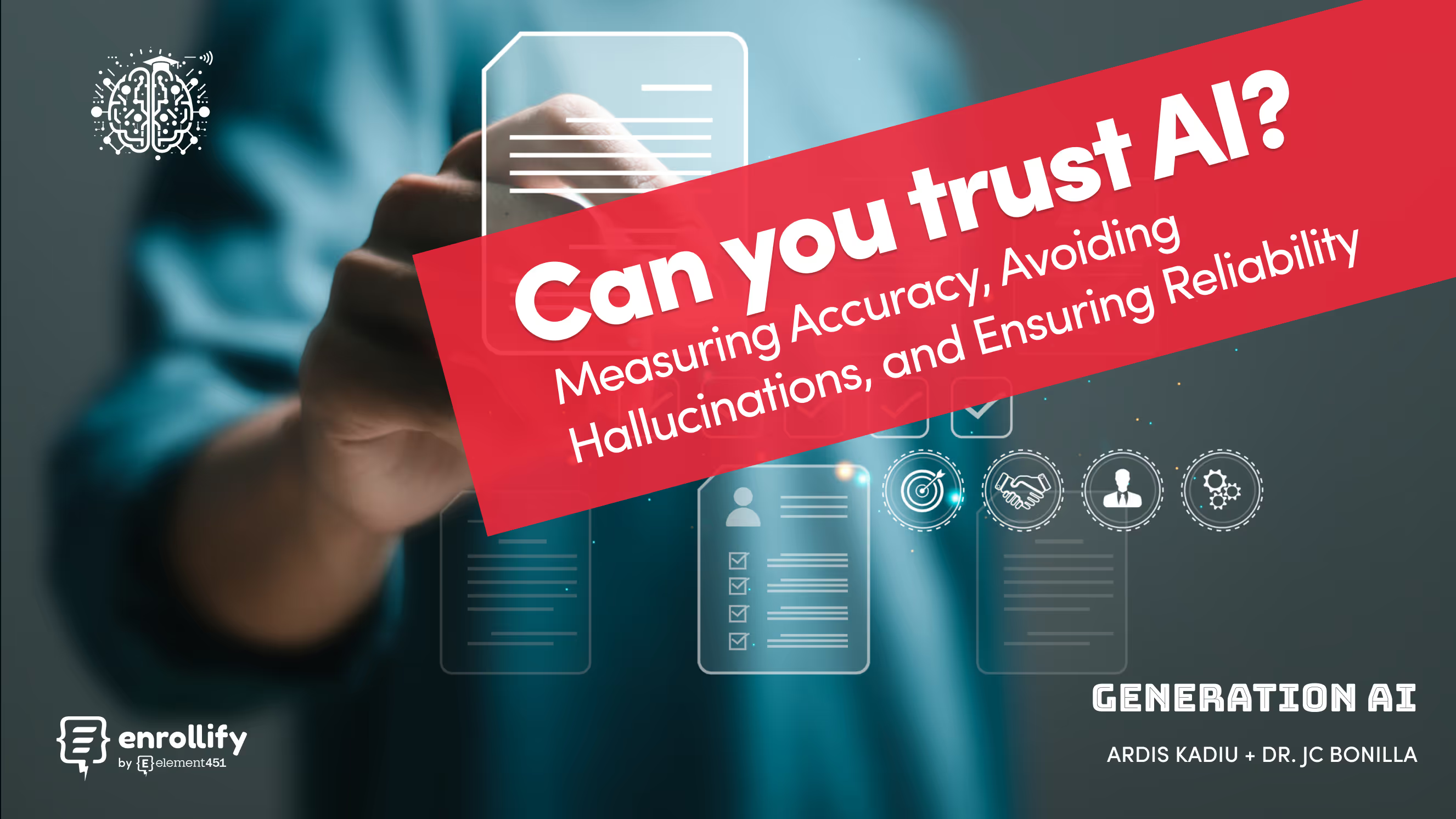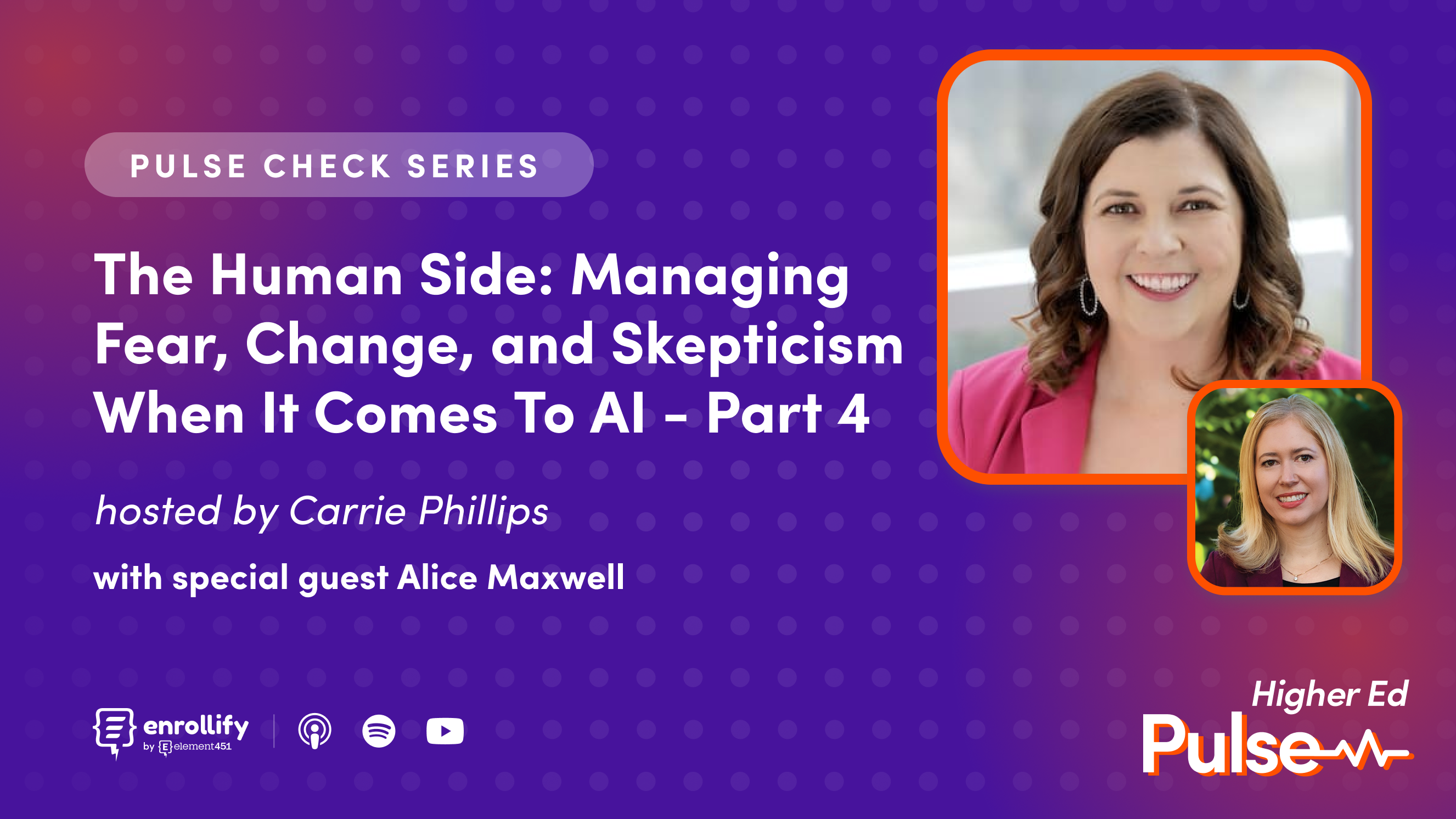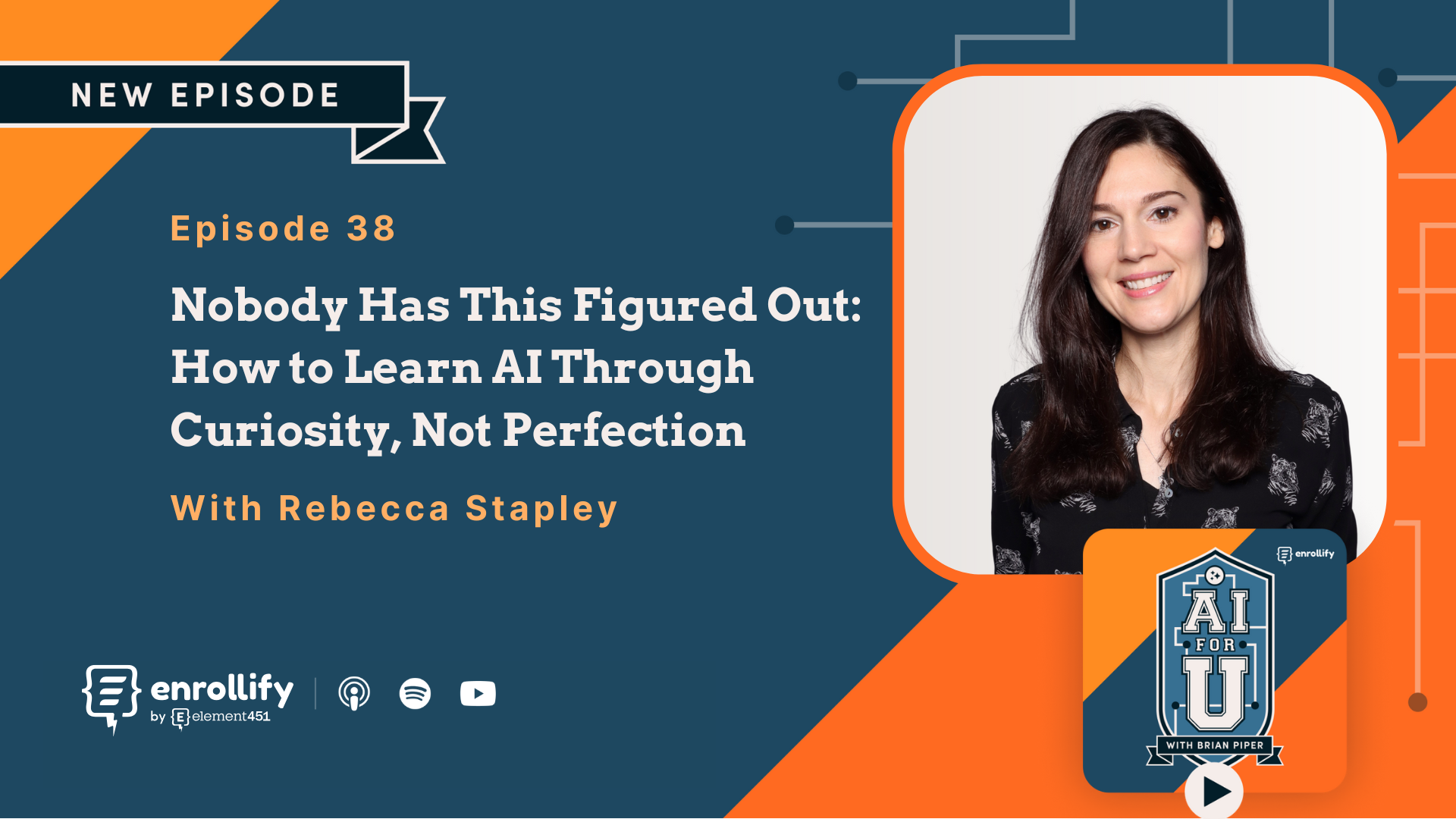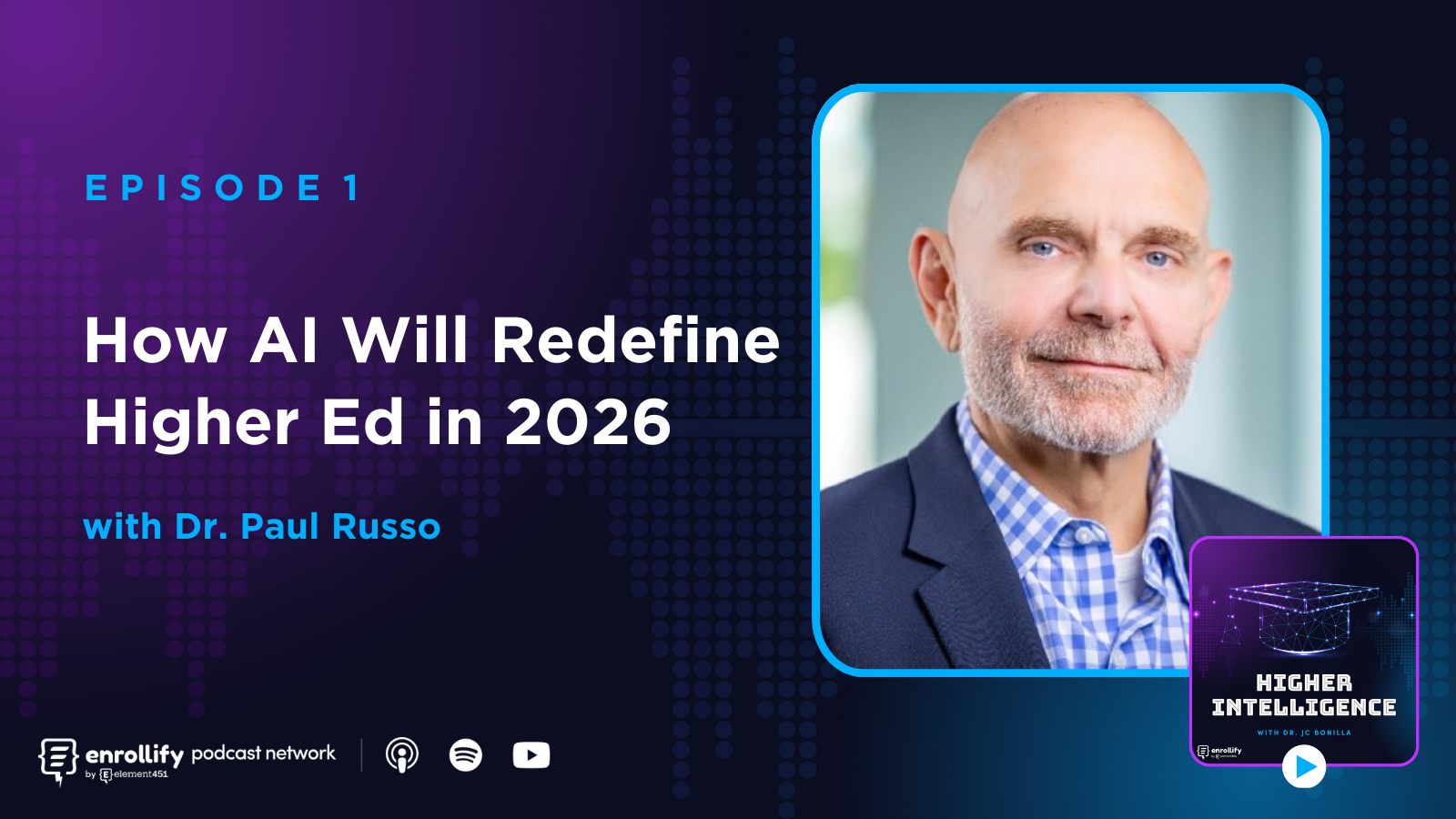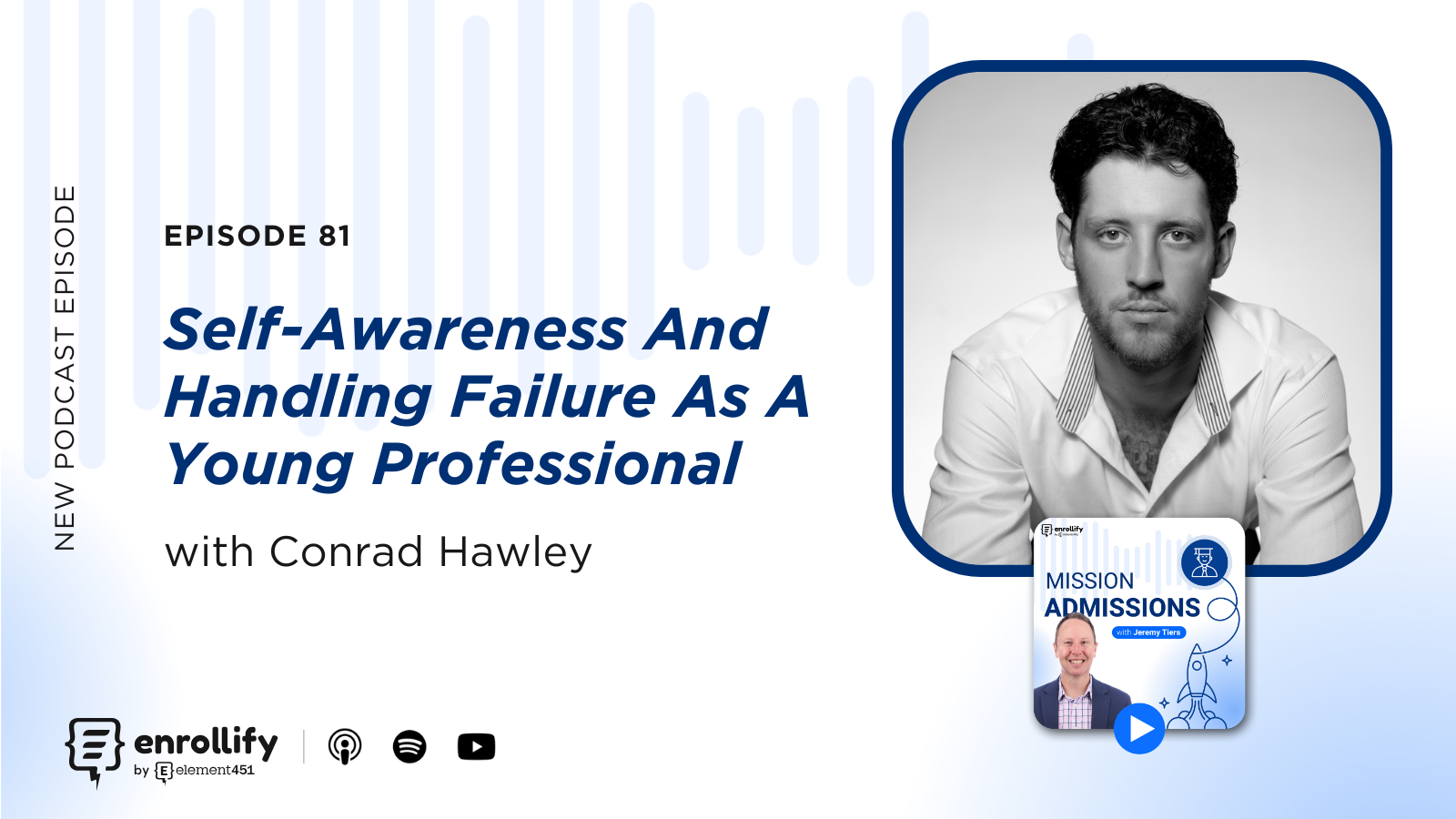About the Episode
About The Episode:
In this episode of Generation AI, hosts JC and Ardis tackle one of the most pressing concerns in higher education today: how to trust AI outputs. They explore the psychology of trust in technology, the evaluation frameworks used to measure AI accuracy, and how Retrieval Augmented Generation (RAG) helps ground AI responses in factual data. The conversation offers practical insights for higher education professionals who want to implement AI solutions but worry about accuracy and reliability. Listeners will learn how to evaluate AI systems, what questions to ask vendors, and why having public-facing content is crucial for effective AI implementation.
Key Takeaways
- Trust in AI is built through reliability, transparency, and predictability. Understanding how human psychology influences trust in technology helps frame AI adoption.
- AI evaluation frameworks, like OpenAI Evals, measure accuracy beyond traditional predictive modeling. These frameworks use large-scale test sets to validate AI outputs.
- Retrieval Augmented Generation (RAG) grounds AI responses in factual data. This method functions like an "open book exam," pulling from multiple documents to ensure accuracy.
- "Garbage in, garbage out" is often misunderstood. Public-facing content, like your institution’s website, can be a strong foundation for AI-driven engagement.
- When AI says "I don’t know," that’s a sign of trustworthiness. The ability to admit uncertainty is better than generating misleading or false information.
- Asking the right questions helps distinguish between AI vendors who talk about accuracy and those who actually implement best practices.
How Does Trust in AI Work?
AI trust isn’t just a technical issue—it’s psychological. JC and Ardis explain how human decision-making around trust applies to technology. When we use AI, we go through a mental process similar to how we evaluate human reliability. Are the AI’s responses consistent? Can we predict its behavior? Is it making responsible decisions? These factors determine whether we see AI as a helpful tool or a risky unknown.
To build trust, AI must demonstrate reliability over time. Think about how people have gradually accepted autonomous vehicles—when small, predictable decisions align with human expectations, trust increases. The same principle applies to AI in higher education. Institutions adopting AI must focus on making outputs consistent, understandable, and transparent.
How Do You Evaluate AI Outputs?
Traditional machine learning models rely on accuracy metrics like precision and recall, but AI requires a different approach. OpenAI Evals is one such framework that tests AI performance by generating thousands of variations in test sets. Essentially, this method uses "AI to check AI" and ensures responses align with factual data.
Element451, a higher ed AI platform, applies rigorous evaluations to its AI models, achieving 94-95% accuracy in testing. This kind of structured evaluation helps institutions measure AI effectiveness beyond surface-level impressions. If you're selecting an AI tool, ask vendors how they test accuracy—if they can’t provide clear answers, that’s a red flag.
What is Retrieval Augmented Generation (RAG) and Why Does It Matter?
RAG is a game-changer for AI reliability. Instead of generating responses from scratch (which can lead to misinformation), RAG functions like an "open book exam," pulling from reliable sources. AI first retrieves relevant data, ranks it by relevance, and then synthesizes an accurate response. This process drastically reduces hallucinations—false or misleading AI-generated information.
Higher education institutions can leverage RAG by feeding AI structured, public-facing content like FAQs, course catalogs, and enrollment policies. This ensures that AI-generated answers are rooted in institutional knowledge, not guesswork.
How Can Institutions Reduce AI Hallucinations?
One of the biggest concerns about AI is its tendency to "hallucinate"—producing incorrect but confident-sounding responses. JC and Ardis explain that hallucinations often stem from poor-quality input data. However, the fear of "garbage in, garbage out" is often exaggerated. Publicly available university content, if well-structured, is usually a sufficient starting point.
Another key trust signal? AI that admits uncertainty. If an AI system tells you "I don’t know" rather than fabricating an answer, that’s a positive sign. It means the system is designed with accuracy and accountability in mind. Institutions should prioritize AI tools that provide source citations and transparency in how they generate responses.
How Do You Choose a Trustworthy AI Partner?
Not all AI vendors follow best practices. Some talk a big game about AI-powered solutions but lack the frameworks needed to ensure accuracy. Higher education professionals should ask potential AI partners key questions, such as:
- How do you evaluate AI accuracy?
- Do you use RAG or another grounding method?
- Can your AI admit when it doesn’t have an answer?
- What kind of data does your AI use for responses?
Vendors who can’t provide clear answers may not have the transparency and reliability your institution needs. AI trust is earned, not assumed, and choosing the right partner is critical to successful implementation.
Connect With Our Co-Hosts:
Ardis Kadiu
About The Enrollify Podcast Network:
Generation AI is a part of the Enrollify Podcast Network. If you like this podcast, chances are you’ll like other Enrollify shows too! Some of our favorites include The EduData Podcast and Visionary Voices: The College President’s Playbook.
Enrollify is produced by Element451 — the next-generation AI student engagement platform helping institutions create meaningful and personalized interactions with students. Learn more at element451.com.







